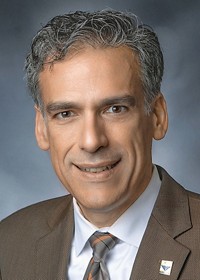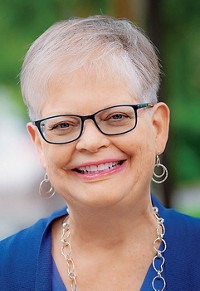Advertisement
Grab your lab coat. Let's get started
Welcome!
Welcome!
Create an account below to get 6 C&EN articles per month, receive newsletters and more - all free.
It seems this is your first time logging in online. Please enter the following information to continue.
As an ACS member you automatically get access to this site. All we need is few more details to create your reading experience.
Not you? Sign in with a different account.
Not you? Sign in with a different account.
ERROR 1
ERROR 1
ERROR 2
ERROR 2
ERROR 2
ERROR 2
ERROR 2
Password and Confirm password must match.
If you have an ACS member number, please enter it here so we can link this account to your membership. (optional)
ERROR 2
ACS values your privacy. By submitting your information, you are gaining access to C&EN and subscribing to our weekly newsletter. We use the information you provide to make your reading experience better, and we will never sell your data to third party members.
Elections
For president-elect: Rigoberto Hernandez
by Rigoberto Hernandez, candidate for president-elect
September 9, 2022
| A version of this story appeared in
Volume 100, Issue 32

Georgia Section. Johns Hopkins University, Baltimore, Maryland.
Academic record: Princeton University, BSE, 1989; University of California, Berkeley, PhD, 1993.
Honors: Stanley C. Israel Regional Award for Advancing Diversity in the Chemical Sciences, Southeastern Regional Meeting (SERMACS), 2018; Charles H. Herty Medal, ACS Georgia Section, 2017; ACS Award for Encouraging Disadvantaged Students into Careers in the Chemical Sciences, 2014; Outstanding Service Award, ACS Georgia Section, 2012; ACS Fellow, 2010; Cottrell IMPACT Award, Research Corporation for Science Advancement (RCSA), 2020; Royal Society Chemistry (RSC) Fellow, 2020; Transformational Research and Excellence in Education Award (TREE), RCSA, 2016; Phi Beta Kappa Visiting Scholar, 2015–16; Diversity Award, Council of Chemical Research, 2015; Diversity Champion Award, Georgia Tech, 2013; American Physical Society (APS) Fellow, 2011; Vasser Woolley Faculty Fellow, Georgia Institute of Technology, 2011–13; Humboldt Research Fellow, 2006–08; American Association for the Advancement of Science (AAAS), fellow, 2005; Goizueta Foundation Junior Professor, Georgia Institute of Technology, 2002–06; Alfred P. Sloan Fellow, 2000; Sigma Xi Southeast Regional Young Investigator, 2002, 2000; RCSA Cottrell Scholar, 1999; Blanchard Assistant Professor of Chemistry, Georgia Institute of Technology, 1999–01; National Science Foundation (NSF) CAREER Award, 1997; Feinberg Postdoctoral Fellow, 1994; AT&T Cooperative Research Fellowship Program (CRFP) Fellow, 1989–93; NSF Graduate Fellow, 1989–92; and Sigma Xi, member, 1994.
Professional positions (for the past 10 years): Johns Hopkins University, Gompf Family Professor of Chemistry, 2016–, professor of chemical and biomolecular engineering, by courtesy, 2020–, professor, materials science and engineering, by courtesy, 2020–; Open Chemistry Collaborative in Diversity Equity (OXIDE), director, 2011–; Georgia Institute of Technology, adjunct professor, 2016–18, professor, 2009–16, associate professor, 2002–09, Center for Computational Molecular Sciences and Technology, co-director, 2000–16.
Service in ACS national offices: Society Committee on Publications, member, 2022–24; Committee on Budget and Finance, member, 2016–21; National Awards Advisory Board, chair, 2018–21; Board of Directors, director, district IV, 2014–19, councilor ex-officio, 2014–19; Committee on Professional and Member Relations, member, 2017–19, 2014; Committee on Grants and Awards, member, 2014–16; Committee on Science, member, 2013; Committee on Committees, member, 2009–12; Committee on Divisional Activities (DAC), member, 2004–08; Joint subcommittee, DAC and Local Section Activities, co-chair, 2005–07; Board Committee on Minorities in Academe Implementation Team, 2003–04; Hildebrandt Award Canvassing Committee, 2002–04.
Service in ACS offices: Georgia Section: bylaw councilor, 2012; alternate councilor, 2012–13; councilor, 2003–11; past-chair, 2000; chair, 1999; chair-elect, 1998; Herty Award Committee, chair, 2006–16; 75th Herty Medal Celebration, chair, 2009; Herty Medal Undergraduate Research Symposium, founding chair, 2006–10. Computers in Chemistry Division: alternate councilor, 2013.
Member: Member of ACS since 1992. AAAS; APS; Biophysical Society.
ACS Divisions: Computers in Chemistry; Physical Chemistry.
Related activities: Editorial Advisory Board, Chemical Reviews, 2022–; Committee on Opportunities in Science, AAAS, chair 2022– and member 2020–; Editorial Advisory Board, Journal of Physical Chemistry, 2019–; Academic Leadership Training Workshop, co-founder and chair, 2016–; Minority NSF, Science Technology Engineering and Mathematics (STEM) PhD Advisory Committee, Sloan Foundation, 2013–; Review Committee, Chemical Machinery of the Cell SciaLog, RCSA, member 2018–21; Science and Software Advisory Board, Molecular Sciences Software Institute, 2017–19, chair, 2019, vice-chair, 2018; Review Committee, Molecules Come to Life, SciaLog, RCSA, member 2015–17; Cottrell Scholars, advisory committee, RCSA, member, 2011–17, chair, 2016–17; STEM Education Review Committee, AAAS, 2015–16; Executive Board, Georgia Institute of Technology Faculty, 2013–16; National Institutes of Health (NIH), Macromolecular Structure and Function B (MSFB) Study Section, 2009–13; National Academies Board on Chemical Sciences and Technology, 2007–10; Board of Directors of Telluride Science Research Center, 2007–09; External Review Committee, Morehouse College chemistry department, 2007; Steering committee for NSF workshop on complexity and emergent phenomena, member, 2007; Steering committee for NSF workshop on excellence empowered by a diverse workforce, member 2007; National Academies Committee on Revealing Chemistry through Advanced Chemical Imaging, member 2005–06; published more than 160 peer-reviewed articles.
Hernandez’s statement
Do you still need the American Chemical Society? We were here together when you started your path as a chemist. If you are reading this, we are still together as you have continued to see and experience the value of ACS membership. Together, we publish the leading molecular science, we train chemists at all stages of their careers, we advocate for science and education to the public and governments, and we accelerate careers and innovation in chemistry, molecular science, and engineering. Despite this, our society faces an existential crisis posed by declining memberships as social media and other technologies are flattening communication and access to professional networking. Thus, ACS must change, and I ask you to help me make the changes that you and our future members need.
ACS should be the first place everyone turns to when they have any concerns related to the chemical sciences and engineering. Our journals are the “Most trusted. Most cited. Most Read.” They are the first place many turn to when they want to disseminate or learn new advances in our discipline and practice. Our national and international meetings have historically been among the largest such meetings in chemistry. Many chemists still receive their first grant, as well as paradigm-shifting grants later in their career, from our Petroleum Research Fund. The US Congress chartered ACS in 1937 as an advocate for the chemical enterprise and its practitioners. Thus, in many ways, ACS has been first in the chemical sciences for the past century or more. The challenge and responsibility for us is to redefine and expand what it means to be “ACS First” across all our membership worldwide, and to do this in a way that helps existing and emerging members appreciate the value of our society. To this end, if elected, I would commission an ACS First Task Force charged to establish an ACS First brand and provide a vision for how ACS can be the primary home for chemists and all who wish to interact with us.
Perhaps the easiest way to ensure that once a chemist is a member of the ACS, they remain a member is to offer ACS life memberships. After all, what binds us together is not necessarily what we work on now. Instead, it is the way we think about solving problems from a molecular perspective. In my March 5, 2018, C&EN Comment titled, “ACS: Your Brick-and-Mortar and Virtual Network All in One,” I argued that this commonality among our very diverse membership is the key to the value proposition for being members. So, if we can be chemists for life, why can’t we also be ACS members for life? There are challenges to taking this vision to reality because we must work out the finances of such an offer, and we will need to clarify the rights and responsibilities of life members.
If elected, I would champion an ACS for Life Task Force charged to construct an implementation plan that would allow members to truly be engaged with ACS throughout their lives.
In recent years, we have learned the power of ACS to address the challenge of chemical safety by way of creating a safety culture. That is, safety is not just something we talk about in a yearly training class, but rather it is something ingrained through continuous practice. In a similar way, advancing diversity, equity, and inclusion is not a practice that we can do through onetime events or training. I have learned through my work with OXIDE that creating and fostering a diversity culture is critical for advancing inclusive excellence. I am excited about the new directions by ACS to establish diversity, equity, inclusion, and respect as a core value. I look forward to taking it to action through championing ACS for All by promoting a diversity culture throughout all our activities.
I hope that you will give me the chance to advance ACS First, ACS for Life- and ACS for All over the next few years. Promotion of the ACS First brand would remind not just members, but all the chemical enterprise, government organizations, and the public, that they should turn to us when they need chemical solutions or advice. Life members would provide stability to our membership and would allow us to reward such members with the security of engagement with us throughout their lives. Finally, we are stronger because of the diversity of our membership—spanning many disciplines and people from different races, ethnicities, and countries—and we can ensure that strength only through the inclusion and belonging that an authentic diversity culture will bring. I ask you to help me make the change you want and need for the ACS. Together, we can.
For more information on our activities and on ways to engage with us, please go to www.rigobertohernandez.org or find me on Twitter at @EveryWhereChem.




Join the conversation
Contact the reporter
Submit a Letter to the Editor for publication
Engage with us on Twitter